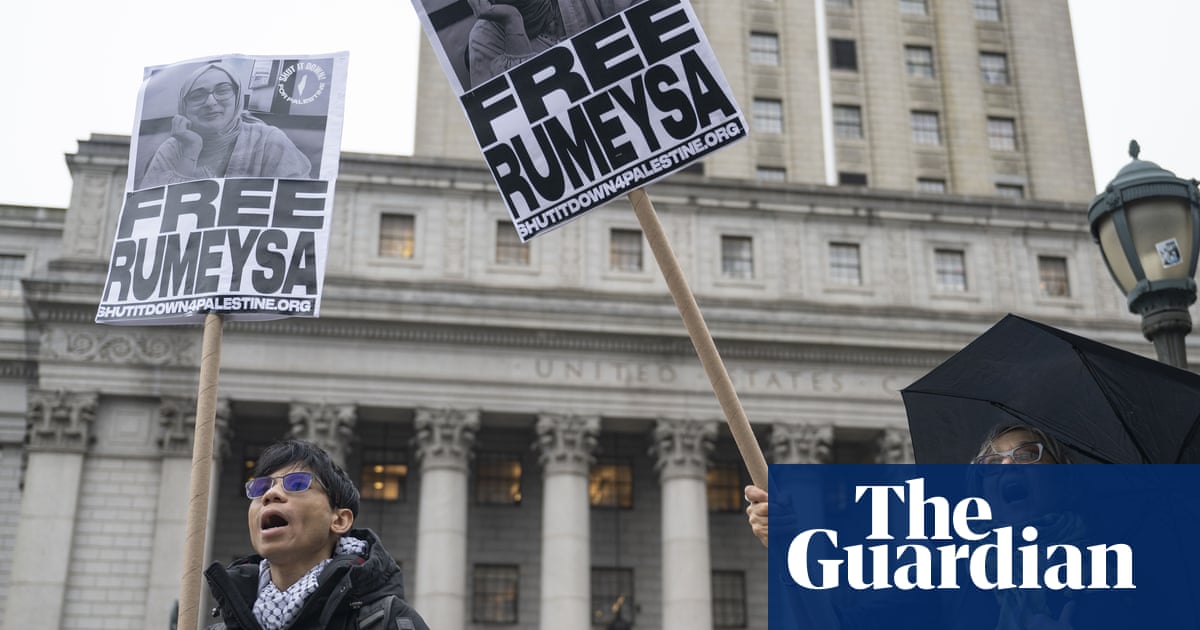Amy*, a federal US government employee working for homeland security who was hired by the Joe Biden administration’s refugee programme, has not left her phone out of her sight since last Tuesday, when the Elon Musk-led push for mass voluntary redundancies of government workers began.
Since the US office of personnel management (OPM) sent nearly all of the federal government’s 3 million employees an email offering them deferred resignations and warning that, if they choose to stay, they may be laid off or reassigned, US career civil servants have been weighing their options.
“It’s just been crazy. A billionaire is taking over a government,” Amy said. “The executive orders against the federal workforce feel designed to create chaos and fear. Musk calls us lazy and described workers at the US Agency for International Development (USAid) as a ‘ball of worms’. They’re trying to dehumanise us to make these changes more palatable, and are trying to rattle enough of us so that a majority of federal employees leave.”
Amy was among scores of civil servants from across America who shared with the Guardian what they intend to do with the Trump administration’s “fork in the road” buyout offer, designed to dramatically reduce the ranks of left-leaning federal workers.
“While many may think federal employees should take the offer and run, I haven’t spoken to a single person jumping at it,” she said. “Everyone is still digging their heels in and is intent on not taking it. We’re also feeling petty as hell.”
Although her department does not qualify for voluntary redundancies, Amy is affected by the blanket return to the office order that was issued.
“I was hired for a fully remote position,” she said. “I spend six to eight months every year overseas helping refugees who are trying to enter the US. So many of us are trying to continue focusing on our work while being told to immediately return to the office, but also to not return to the office yet because there is not space for all of us nor the resources to relocate everyone.
“The refugee program has been suspended, so we don’t know the future of it, but I feel really determined to stick it out so that the budget for me cannot be used for somebody else who doesn’t care about refugees and [will] infiltrate this line of work to do harm or to prevent good from being done.”
Amy’s remarks reflected those of scores of other federal government workers who presented themselves as a united front in defiance of Musk and Trump, but there were some who felt it was possibly time to resign from their careers.
For Riordan, a trans, autistic, disabled veteran who has worked for nearly 20 years for the government, the last few weeks have been stressful and “too much” for their mental health. Feeling “tired”, Riordan wants to hold on until they can retire early.
“It’s upsetting. The stereotype of the lazy government worker has persisted for a long time but the majority of us have been working our asses off to serve our populations.”
Federal workers have been told that those eligible for voluntary early retirement (Vera) can combine it with their deferred resignation, but Riordan is cautious.
“I’m not going to take the chance right now. We’re not even sure what is being offered is legal. [If I’ll be eligible for Vera] I will take it in a second because I’m ready to get out of here. I don’t want to work for Trump and I don’t want to work for Musk. I’ll sell the house and move to a blue state where I can be with my family. For now, I’m just going to delete the emails and ignore them.”
A long-term government employee at USAid from the east coast who had been working on programs in the developing world shared her disbelief at how her agency has begun being dismantled.
“After going dark for several days, the USAid website was relaunched to tell the world that the entire workforce is being put on administrative leave,” she said. “Every message to my agency’s workforce has been hostile and intimidating with threats of disciplinary action and no space for disagreement with orders from the White House. All of the communication we have received expresses lack of trust in us and our judgment.
“As a result of the stop-work order that has affected most of the work USAid funds, our workforce is glued to our computers with nothing to do. The American public is not benefiting from this in any way.”
Deaths and illness around the world could result from the halt of USAid assistance that contributes to global security, she warned, adding that despite everything she had decided to stay.
“For a second, the [buyout offer] sounded kind of appealing, but I quickly heard voices I trust – employee unions, lawyers, Senator Tim Kaine from Virginia – who raised questions and told people to be very cautious. There’s no funding for this [buyout programme], there’s no guarantee, so I’m not going to take it. This is unprecedented.”
after newsletter promotion
Martin Heyworth, a former chief of staff at the US Department of Veterans Affairs (VA) in Philadelphia between 1999 and 2009 who retired from federal employment in 2017, disagreed and pointed out that Bill Clinton as well as Barack Obama had ordered large buyout programmes of federal workers during their presidencies.
“Offering buyouts is not new and has been standard practice in the US federal government for the last several decades, whether under a Republican or a Democratic president. The phenomenon is neither Republican- nor Trump-specific, and it’s being construed as a sort of Trump-related dysfunction, which I think is not accurate.
“I did not vote for Trump, I voted for Jill Stein, and although he does things that are problematic, I think he needs to be given a chance.”
Elizabeth, a federal immigration enforcement attorney from the west coast, learned a few days ago that her department would be exempt from the buyout, but that she would have to return to the office despite her flexible hybrid union contract.
“I’m a single mother, and the flexibility of this job is what is keeping me sane,” she said. “I have so many court appointments, I just don’t know whether I could handle having to come into the office all the time in between for the next four years.
“I currently have no plans of quitting, but I’d have to strongly consider other job options, depending on how draconian they want to be on this.”
Elizabeth, who is Black, added that the administration’s decision to suspend DEI practices and departments across the federal government was also “extremely upsetting”. “I’ve been having problems concentrating all week. A handful of people in my office support Trump, but others are very liberal. Politically like-minded people and I are concerned. Power is being given to Elon Musk.”
Another major worry, Elizabeth said, was the prospect of being subjected to loyalty tests as part of future workplace evaluations, while she insisted that her political dislike of the Trump administration would not undermine her professionalism.
“I’m not taking a loyalty test for any president. We all take an oath, our job is to uphold the laws of the United States. It is not to pledge loyalty to anyone. I can have my views about any politician but still be able to do my job.”
An older remote worker for the Department of Veterans Affairs said her office had been “swamped with calls from stressed-out employees considering the deferred resignation but without sufficient information to make a decision within the very limited timeframe”.
“If they don’t take the deferred resignation,” she said, “will they need to return to the office even though there is no identified office space? Will they have to relocate in order to keep working? Will their jobs be eliminated? Exactly how does this affect their retirement benefits?”
She described emails coming from the administration as “callous” and “staggering”.
“Even though we try to refrain from any overtly political comments,” she said, “it was clear that most people I spoke to viewed the ‘[fork in the road]’ email as craven and hypocritical. ‘Enhanced standards of conduct’ – from an administration headed by a felon, a sexual predator, a pathological liar with no respect for the rule of law? What a joke.”
A probationary Department of Homeland Security employee from the midwest who wanted to stay anonymous said she would be taking the deferred resignation offer.
“I do believe [this offer] is likely illegal and the administration will stiff me, but it doesn’t really matter in my case,” she said. “I only signed on to the federal government for the remote and telework benefits, and now that’s gone, I can cut ties and return to my old job, where I made more money, worked fewer days and hours, and had a shorter commute.”
A combat veteran federal government worker from the north-west expressed a steely resolve to resist.
“We laugh at [Trump] during meetings, trying to make sense of the nonsense spilling out of the White House,” she said. “His disregard for laws, morality and humanity proves how intimidated he is by real Americans making real contributions. I hold the line and dare him to fucking fire me.”
*Name has been changed

 3 months ago
48
3 months ago
48













































